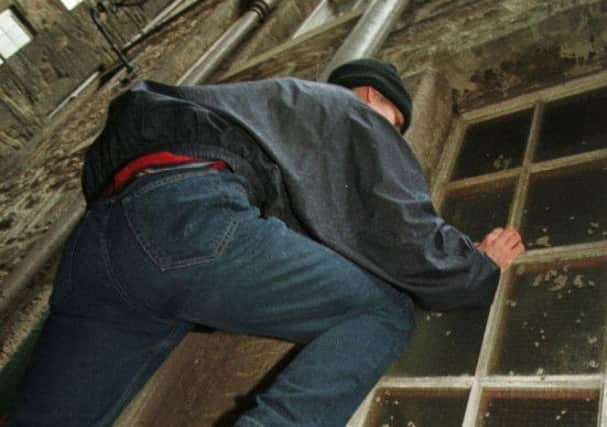Housebreaking detection rates soar in Edinburgh


Dedicated squads to tackle burglaries across the Capital were controversially scrapped after Lothian and Borders Police was merged into the single Police Scotland force.
But detection rates – which previously averaged around 40 per cent – plummeted to just 17 per cent and police chiefs were forced to introduce a new 47-strong specialist unit under Operation RAC.
Advertisement
Hide AdAdvertisement
Hide AdNow latest statistics show the detection rate is back up to 37.5 per cent for the six months between April and September this year, compared with 21.4 per cent for the same period last year.
Edinburgh’s Tory leader, Councillor Cameron Rose, a former policeman, hailed the figures as proof that the original approach had been the right one.
He said: “I welcome the resumption of the downward trend in housebreaking. Crime generally has been going down for some time now, but Police Scotland in its first year did not respond adequately to outbreaks of housebreaking and in some areas it got out of control.”
The figures show that the number of housebreakings over the six months has fallen from 960 last year to 766 this year.
Cllr Rose said: “There are still too many people finding themselves victims of housebreaking.
“The invasion of a person’s home can be devastating – and while Police Scotland have adopted a focus on personal violence, there are a lot of people who have felt let down over this area.
“The police need to be nimble in responding to particular outbreaks, and that’s where Police Scotland let themselves – and all of us – down in their first year.
“They should have acknowledged they got it wrong and responded more quickly.
Advertisement
Hide AdAdvertisement
Hide Ad“We will scrutinise with interest the future response to spikes in crime.”
In a report to councillors detailing the housebreaking figures, the police said: “Following the success of Operation RAC, dwelling housebreakings are allocated to community investigation units who have an extensive knowledge of the repeat and high-tariff offenders.
“This process and knowledge expedites the detection of these crimes.”
The statistics also show a dramatic reduction in the much-criticised use of police stop-and-search powers in Edinburgh.
In the first year of Police Scotland, the Capital saw a 40 per cent boom in stop-and-search activity with officers frisking nearly 30,000 suspects – around 82 cases a day.
About a fifth of these were producing hidden drugs, weapons, stolen property, alcohol or other items.
But the number has now fallen. A total of 12,659 stop-and-searches were conducted between April and September this year compared with 17,221 in the same period last year – a reduction of 26.5 per cent.
At the same time, the proportion of stop-and-searches classed as “positive” increased by 9.1 per cent from 21.7 per cent to 30.8 per cent.
Advertisement
Hide AdAdvertisement
Hide AdPolice said the rise in positive searches reflected the targeted, intelligence-led approach now adopted.
It also noted the increase in legal highs – or New Psychoactive Substances – had contributed to the increase in positive stop-and-searches.
The police commentary in the report to councillors said: “The use of stop-and-search will continue in order to further reduce violent crime within Edinburgh and remove weapons and drugs from the community.”
Green councillor Melanie Main welcomed the fall in the number of stop-and-searches reported but said it had to be seen in context of the last couple of years.
She said: “Last year when Police Scotland took over from Lothian and Borders Police, I raised serious concerns about the huge 42 per cent increase in the blanket use of stop-and-search across the city, with four out of every five shown to be unfounded. Not surprisingly there was a marked increase in complaints from young people feeling harassed. I expect to see a continued reduction in the number of stop-and-searches as the result of clear targeting and the use of these powers only when clearly justified.”
The scrapping of the housebreaking detection squads and the increased use of stop-and-search were seen as a direct result of switches in policy under the single force.
Similar controversy surrounded the crackdown on sex-for-sale saunas in the Capital and the use of armed officers on routine patrol – a policy now reversed.
Edinburgh West Liberal Democrat MP and former policeman Mike Crockart welcomed the latest figures, but said the police seemed only to react to criticism.
Advertisement
Hide AdAdvertisement
Hide AdHe said: “It’s great that crime stats indicate that local police here in Edinburgh are beginning to get back on top of this dreadful crime of housebreaking.
“But it’s disappointing that it took a furore around the removal of those specialist housebreaking units and the resultant spike in break-ins to lessen the number of people suffering as a result of this crime. Stop-and-search stats seem to back up this trend that Police Scotland react to public opinion rather than consult, plan and deliver on local priorities.”
Speeding offences down
THE number of speeding offences recorded in the Capital has more than halved since last year.
The latest statistics show a total of 624 in the six months from April to September this year, compared with 1502 in the same period of 2013.
Similarly, mobile phone offences were down from 1335 to 595 and seat belt offences from 1246 to 508.
Critics have accused police of relying too heavily on special operations to “blitz” particular types of motoring offences.
Police say speeding and road safety are top priorities for many communities.
But in their commentary on the statistics, the police defended their approach.
Advertisement
Hide AdAdvertisement
Hide AdThey said: “The decrease in speeding detections is acknowledged. Roads policing officers are currently deployed in areas of particular significance to provide a high-visibility presence and education.
“It is anticipated that this approach will reduce road casualties through prevention and raised awareness of the dangers of excessive speed.”